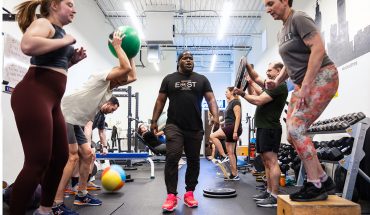by Bill Krueger
It is a familiar ritual after each Carolina RailHawks game at WakeMed Soccer Park in Cary. Win or lose, fans scurry down to the first couple of rows of the stands to get autographs from the players, many of whom linger for several minutes to sign shirts, programs, tickets and, in some cases, body parts. No one is in greater demand than defender Kupono Low.
“Kupono, can I get a picture with you?”
“Good game, Kupono.”
“Can you sign my arm?”
Low, 35, tries to oblige every fan, many of them kids who play for one of the many youth soccer leagues in the area, and is unerringly polite with all of them (“Your arm? All right, but don’t get me in trouble with your parents.”) A group of fans known as the Triangle Soccer Fanatics unfurl a sheet painted to honor Low for his 200th game with the RailHawks, and Low helps to straighten it out before posing for a picture with the group. Several autographs later, a dad in the stands points Low out to his son.
“That’s Mr. RailHawk,” he says.
It is an unofficial title, but one that Low embraces as he is in the midst of his eighth season with the club. He has been with the RailHawks from the beginning. He scored the first goal in the team’s inaugural game in 2007 and holds the official club records for appearances, starts, and minutes played, as well as the unofficial club record for autographs signed. He has played for three different head coaches with the RailHawks and an ever-changing roster of players on a club that plays in the North American Soccer League (NASL), the second tier of American professional soccer (with Major League Soccer, or MLS, at the top).
“The word I would use for Kupono is consistency,” says Curt Johnson, president of the RailHawks. “It’s huge for the organization to be able to rely on somebody like that game in and game out, year in and year out. He brings it every single game.”
But if Low (whose first name means “honorable” in Hawaiian) appreciates the positive feelings that come with his unofficial title — he is proud to be one of the leading lights for the bustling soccer community in the Triangle — he is also a bit bemused by the notions of stability and steadfastness that the name implies. That’s because his journey here was a circuitous route that often saw him forced to take a couple of steps back after he got a chance to take a few steps forward in his pursuit of a professional soccer career. “My goal wasn’t always to get to the MLS, but to play at the highest level I possibly could,” Low says.
Low grew up in Fremont, Calif., not far from San Francisco. He played soccer for several years for a team coached by his father, who started his own machine company after retiring from the Air Force. Low’s first experiences with soccer were nothing like what many of his young fans now experience. Today’s young players often play soccer year-round, eschewing other sports at an early age so they can take full advantage of the training offered by professional coaches (which include Low, who coaches a boys’ team for Triangle Futbol Club) to increase their chances of being spotted by college coaches at showcase events around the country.
That was not the case for Low, whose first love was basketball. Much of his childhood was spent practicing Michael Jordan’s moves as he dreamed of a career in the NBA. After school, Low would play basketball at a local park before soccer practice, and then shoot some more hoops on a basketball goal in his driveway after soccer practice.
Best on the field
It was not until he got to high school that Low was forced to make a choice — by the school’s basketball coach. He chose soccer and had his first experience playing on a travel team made up of some of the best players in the region. But Low had no specific plans for making it to the next level, no training regimen designed to improve his game and expose him to college coaches.
“I just always wanted to be the best player on the field,” he says. “That was how I got better.”
Low often achieved his goal. He was the lone player from Fresno State to make the all-conference team when the college joined the competitive PAC-10 in his senior year. But he was also about to experience the ups-and-downs of trying to make his living as a soccer player.
He was disappointed not to be invited to the MLS scouting combine that year, and ended up playing for a small-time professional team near his home in California for a couple of hundred dollars a month. Low missed out on a shot at a developmental contract with the MLS team in San Jose – perhaps the most talented team in the league at the time – because he was a year too old under league rules.
That led to a brief stint with a minor league team in Syracuse, N.Y., and then a season with the Sligo Rovers, a rough-and-tumble professional team in Ireland that Low helped earn a promotion to the vaunted Premier Division. “I’m not sure how my agent worked that out,” he recalls matter-of-factly. “There were a lot of players there in my situation, who didn’t know how we ended up there.”
But, again, Low managed to be the best player on the field, earning a spot on the league’s all-star team. Homesickness got the better of him, though, and he told his coaches he was leaving with a couple of games left in the season to get back to the United States. He ended up, in 2005, on a team in Virginia Beach, Va., that folded two years later. It was then that he came to Raleigh to join the RailHawks. He didn’t know it at the time, but he had finally found a home.
Rocky start
The team got off to a rocky start, losing to Wake Forest University in the first pre-season game that Low played in. But Low was impressed with the facilities and the fan support the team enjoyed in the early years. By his third year, Low was one of the highest-paid players on the roster and was starting to think about sticking around awhile.
But Low is not comfortable with the notion of being too comfortable. He opts to sign one-year contracts every year. “It puts me under pressure,” he says. “I have to perform. I have to stay healthy. That’s how I have always done it, always pushed myself out of my comfort zone. I’m always pushing myself to get better.”
Zack Schilawski, one of Low’s teammates on the RailHawks, says that approach pays off. “He’s one of the more consistent players we have in terms of training every day,” Schilawski says. “He doesn’t take any days off. He shows up and gives you a solid performance every day.”
Part of what Low loves about soccer is that the game continues to present new challenges. “Every game is different,” he says. “I’m always put in different situations. I don’t know what they’re going to do, and they don’t know what we’re going to do. It’s a completely fresh slate.”
As he has gotten older – he is married now with three children – Low has felt the need to step up his fitness regimen. He has added yoga to maintain his flexibility and makes it a point to run a mile or so further than his teammates on training days. While he welcomes his role as a team ambassador, he wants the club to pay him based strictly on his performance on the field. As for how long he will play (star player Landon Donovan was replaced on the U.S. Men’s National Team at the age of 32, three years younger than Low), Low does not have a timetable. “Until players start running past me,” he says.
Low has seen some of his teammates move on to the MLS during his years with the RailHawks. He almost got a shot at playing with New York’s MLS team at one point a few years ago, but it fell through due to factors having nothing to do with Low.
But Low is at peace with that, comfortable with being known as Mr. RailHawk and maintaining his hold on the left back position at WakeMed Soccer Park. He has started to put down roots that will keep him in the area when his playing days are eventually done. In addition to his work as a coach, Low has started his own youth development academy to offer young players the sort of specialized soccer training that he did not receive as a child. He is also director of soccer at Dreamsports Center, an indoor facility near his home in Apex.
“It’s something every player wants in their career, an area that they can call home, to be a part of the community, to be an important piece of the club,” he says. “I’m totally grateful that this happened.”






